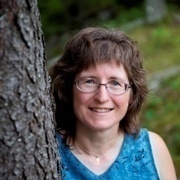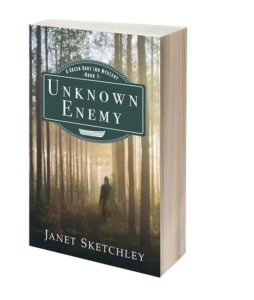 I’ve had the pleasure of working with Janet Sketchley on FellowScript for the past three years, as she does the acquisitions for the newsletter and writes a regular fiction column. She is a Canadian writer whose passion is fiction (Christian women’s suspense). Her unpublished novel, Praying for the Enemy, was short-listed for the 2008 Best New Canadian Christian Author Award. She’s had over 80 articles, reviews and stories printed or reprinted.
I’ve had the pleasure of working with Janet Sketchley on FellowScript for the past three years, as she does the acquisitions for the newsletter and writes a regular fiction column. She is a Canadian writer whose passion is fiction (Christian women’s suspense). Her unpublished novel, Praying for the Enemy, was short-listed for the 2008 Best New Canadian Christian Author Award. She’s had over 80 articles, reviews and stories printed or reprinted.
TKM: How did you become a writer?
I’ve always loved stories, and spent a lot of my childhood either reading or imagining. A few times I started writing a novel, but never made it past the opening chapters. University dampened my desire to write, then I got married and life was too full. After I left a stressful job for the role of stay-at-home mom, there was no time for reading or any other creative outlets. Daydreaming kept me sane.
Then one day I got an idea I didn’t want to play out in my mind: what if you came face to face with a killer? The story wouldn’t leave me alone, so I began to write it out. It kept coming, and many revisions later I’m looking for a publisher for that manuscript and a second one.
TKM: What inspires you to write?
 A snatch of remembered dream, fragment of a song, or just a cool “what-if” will drift around in my brain for a while, gathering other tidbits and possibilities, and when it won’t let go of me it’s time to get started. I’ve learned to do more exploratory planning before beginning the actual draft, because it makes for easier revisions.
A snatch of remembered dream, fragment of a song, or just a cool “what-if” will drift around in my brain for a while, gathering other tidbits and possibilities, and when it won’t let go of me it’s time to get started. I’ve learned to do more exploratory planning before beginning the actual draft, because it makes for easier revisions.
TKM: What author do you admire and why?
There are so many, and I’m sure I’m forgetting someone key, but here goes:
- J.R.R. Tolkien and C.S. Lewis, for creating novels that reveal new levels on subsequent readings and that “show,” rather than “tell,” us about God.
- Robert Jordan, for his detailed world-building and the epic scale of his Wheel of Time series.
- Timothy Zahn, for his twist endings and for the way he makes a fun science-fiction story richer with his understanding of tactics and psychology.
- Linda Hall, for neither avoiding nor sensationalizing the hard parts of her stories and for always providing a believable and satisfying ending that offers hope.
- Brandilyn Collins, for her “deep” point of view that takes readers on a fast-paced ride.
- J.K. Rowling, for her persistent belief in her story, for her use of foreshadowing in the early books, and for her composure when elements of the public were hostile.
- Madeleine L’Engle, because she valued truth and was not afraid to be herself even when she too faced hostility.
You can find our more about Janet Sketchley on her website.

6 Comments
Reading this again in 2013, I’m so happy Heaven’s Prey is finally published. And I need to add two more authors to my most-admired list: Brandon Sanderson and Terry Pratchett, for their world-building, deep thinking, and each one’s type of humour.
I didn’t know these things about my FS editor. Great interview, Bonnie!
Joanna, I look forward to reading your novel. Sounds like a very interesting read!
Kimberley
Bonnie, thanks for hosting me and for letting us meet so many interesting writers in previous weeks.
Peter and Val, thanks for your encouraging words!
Blessings as you write.
Nice job, Joanna. It’s always fun to get to “know” more about another writer and I love the premise of your book!
A very good interview, and with clear, sharp responses by Joanna.
Peter.